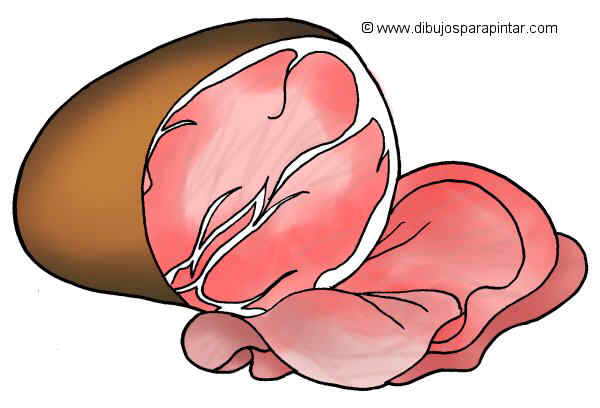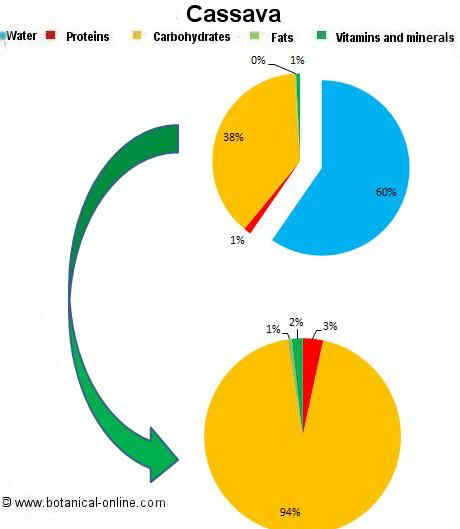Contents
- 1 Functions, types and characteristics of vitamins
- 1.1 What are vitamins?
- 1.2 Properties and functions of vitamins
- 1.3 History of vitamins and their discovery
- 1.4 Composition of vitamins
- 1.5 Vitamin calories
- 1.6 Characteristics and structure of vitamins
- 1.7 Vitamins needs
- 1.8 How many vitamins are there?
- 1.9 List of water-soluble vitamins
- 1.10 List of fat-soluble vitamins
- 1.11 AVITAMINOSIS. PROBLEMS DUE TO LACK OF VITAMINS
- 1.12 Deficit of vitamins
- 1.13 Hazards of vitamins and toxicity
- 1.14 Poor absorption of vitamins
- 1.15 When do we need to obtain more vitamins?
- 1.16 Older people can easily present lack of vitamins problems
- 1.17 Certain body states can “consume” more vitamins.
- 1.18 Deficiency of vitamins because of medication
Functions, types and characteristics of vitamins
What are vitamins?
Vitamins are a series of components that the body needs to function properly and that can not be synthesized, therefore, you must obtain them through the diet.
 A varied and healthy diet can provide all the necessary daily vitamins. If there are problems that affect the absorption or metabolism of the same, it should be supplemented
A varied and healthy diet can provide all the necessary daily vitamins. If there are problems that affect the absorption or metabolism of the same, it should be supplemented
Properties and functions of vitamins
These components allow us to have good health and adequate growth.
All vitamins should be obtained from the diet, with the exception of vitamin D, which although not consumed, we could synthesize it daily in the skin when the sun touches us.
Other vitamins can be manufactured in small quantities by our own microbiota or intestinal flora, but in this case the synthesis is insufficient and is not counted as a good source.
History of vitamins and their discovery
Since ancient times it was thought there were certain ingredients in food needed for good health, but it was not until the twentieth century that they were isolated and their chemical composition was found.
In 1911 the Polish-born biochemist Casimir Funk introduces the term vitamin to refer to these components of food.
The word vitamin is derived from “vitalamina” which is a compound word of “vital” and “amine”. The reason for this name is because scientists thought that the most important substances for life (vital substances) were amines, compounds containing nitrogen. Then it was discovered that not all vitamins were amines, so they renamed them as vitamins.
These compounds generally can not be synthesized by the body (Vitamin D, or solar vitamin, would be an exception) so that we get them from food or from products made by synthesis.
Composition of vitamins
These are organic compounds that, together with proteins, fats and carbohydrates are considered essential nutrients.
For example, many vitamins of group B are bound to proteins, therefore, the foods richest in vitamin B are those that contain many proteins.
The body can not manufacture them or only in very small quantities (with the exception of vitamin D or solar vitamin, which synthesis in the skin is a very important source).

We need solar exposure to produce vitamin D
Vitamin calories
Vitamins do not provide calories.
Characteristics and structure of vitamins
Chemically they are a very heterogeneous group of compounds that are not related to each other.
They are vital because they prevent many diseases associated with their deficit, but unlike the macronutrients (carbohydrates, proteins, fats), vitamins are only required in very small amounts (in mg or mcg quantities – milligrams or micrograms).
* Related information: Properties of vitamins
Vitamins needs
Vitamins are necessary for the proper functioning of the body. To prevent the body from showing signs of lack of vitamins, we need to take a daily dose of them.
The organization determining the body needs of each vitamin is the American Ministry of Health (USDA), which sets these doses known as RDA (Recommended Dietary Allowances). The limits specified by this organism are minimal so that deficit disease does not occur. These should be increased depending on the health status of each person. For example, stress, diarrhea, osteoporosis, an intestinal illness or having a cold increase the needs of certain vitamins.
A varied diet usually provides the necessary vitamins for proper functioning of the body. It is ideal to make a weekly study of the food so the the variety of them contains all the necessary vitamins. However, under certain circumstances, higher doses are required. (See more information on “daily vitamin needs” in the listing below)
How many vitamins are there?
There are a total of 13 vitamins, which are classified into two groups:
- Fat-soluble vitamins: Those that dissolve in fats. There are 4: vitamin A, D, E and K. They are usually found in foods rich in fat, such as vegetable oils, oily fish, avocado or nuts.
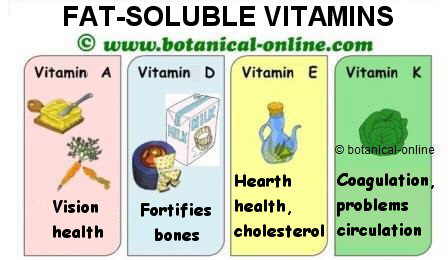 Summary of the properties of liposoluble vitamins, that is, vitamins A, D, E and K.
Summary of the properties of liposoluble vitamins, that is, vitamins A, D, E and K.
- Water soluble vitamins: It is a very heterogeneous group of compounds, from the vitamins of group B, which are very different between them, to vitamin C. Given this diversity, depending on the type of vitamin is in some foods or others. They all dissolve in water, but they are found in a great diversity of foods: meats, fish, shellfish, eggs, are rich in B vitamins (except folic acid and C); Vegetables and fruits are rich in many B vitamins, especially folic acid and vitamin C.
There are 9 vitamins in this group: Thiamine (B1), riboflavin (B2), niacin (B3), pantothenic acid (B5), pyridoxine (B6), biotin (B8), folic acid (B9) and cobalamin (B12) .
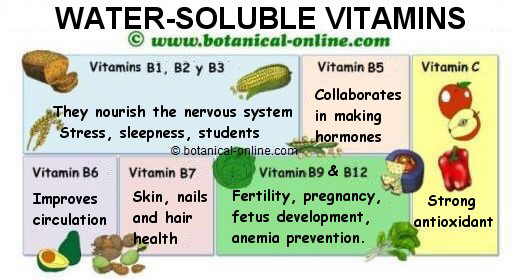 Summary of the properties of water-soluble vitamins, that is, the vitamins of group B and vitamin C.
Summary of the properties of water-soluble vitamins, that is, the vitamins of group B and vitamin C.
* More information: Types of vitamins
List of water-soluble vitamins
They are mostly in foods with lots of water and many of them, together with proteins, therefore, in foods rich in proteins and carbohydrates, and in foods with lots of water, such as cereals, legumes, vegetables, fruits , meats, fish, milk, etc.
These are dissolved in water. Unlike the fat-soluble ones, the body can not store them (the excess is eliminated), so it is necessary to take them every day.
- Vitamin C
- Vitamin B: This is a complex consisting on the following vitamins::
- Vitamin B1 (Thiamine)
- Vitamin B2 (Riboflavin)
- Vitamin B3 (Niacin)
- Vitamin B5 (Pantothenic acid)
- Vitamin B 6 (Pyridoxine)
- Vitamin B7 (Biotin)
- Vitamin B9 (Folic acid)
- Vitamin B12 (Cobalamin)
- Choline
- Inositol
- PABA
- Lipoic Acid
List of fat-soluble vitamins
These are only dissolved in fats. They are stored in body fat, especially in the liver, where they constitute a reserve to be used in case of need. This determines the fact that you do not eat them daily. Fat-soluble vitamins are:
AVITAMINOSIS. PROBLEMS DUE TO LACK OF VITAMINS
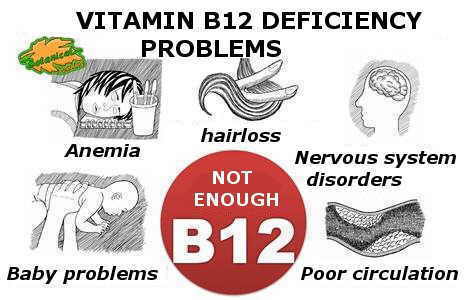 Problems that may appear by a deficiency of vitamin B12
Problems that may appear by a deficiency of vitamin B12
When the body has a shortage of vitamins there is a vitamin deficiency or avitaminosis. Vitamin A deficiency causes a malfunction of the body’s metabolism, causing many diseases.
Deficit of vitamins
The lack of the needed vitamin intake may result from insufficient food, as it happens in poor countries that do not have enough food to ensure the daily RDA for each individual.
In other cases, even with the availability of sufficient food, it is not varied enough or not sufficiently fresh to provide us with all the necessary vitamins. For example, on long sea voyages before the refrigerators were invented, you could not carry enough fruits and vegetables to ensure the needed supply of vitamin C. So, after a few week,s when these fresh foods were not longer available, the sailors had a deficiency of this vitamin that was manifested in the emergence of a disease called scurvy.
The vitamin deficiency is increasingly growing in people who have inadequate diets or in people with eating disorders like anorexia.
However, it is not only the lack of food that is the only cause of vitamin deficiency, since there are many reasons why a person may have a vitamin deficiency.
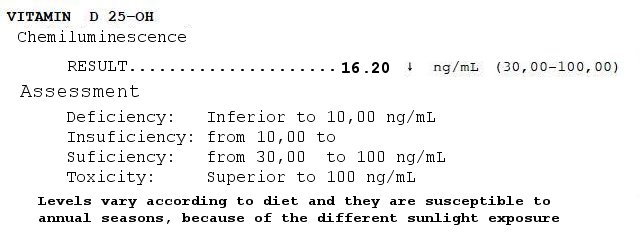
Sample of a blood test where the levels of vitamin D (25-OH) were measured in the spring. Vitamin D deficiency has been found for lack of daily sun exposure and poor diet in foods rich in this vitamin.
Hazards of vitamins and toxicity
Vitamins can become toxic when taken without medical supervision in the form of supplements. In general, water-soluble vitamins do not pose health risks because they are easy to eliminate in the urine, but the excess of fat-soluble vitamins is more difficult to eliminate since it can accumulate in the tissues of the body and reach toxicity from of certain doses.
Poor absorption of vitamins
There are diseases that cause bodily poor absorption of vitamins which leads to a vitamin deficiency. Most of them are intestinal diseases, such as persistent diarrhea, colitis, Crohn’s disease, ulcerative colitis, etc.
Certain drugs or toxic substances also inhibit or destroy the absorption of vitamins, such as tobacco or alcohol.
It is known that smoking causes the destruction of vitamin C; it is estimated that each cigarette destroys 2 mg of this vitamin.
When do we need to obtain more vitamins?
In our lives, there are certain situations or states in which the need to consume more vitamins increases. These situations include pregnancy or breastfeeding.
During this period, the baby gets plenty of vitamins from the mother, so women should increase their vitamin intake to show no weaknesses.
The lack of vitamins in many pregnant and nursing mothers is responsible for some anomalies such as hair loss or skin problems.
The same could be said for the baby. If the baby is breast-fed by the mother, this provides the necessary vitamins, but if he or she is bottle-fed, parents should consult their pediatrician on the possible need for extra vitamins.
 As we get older, we can present some vitamin deficiency
As we get older, we can present some vitamin deficiency
Older people can easily present lack of vitamins problems
Among the possible causes that can generate these deficiencies we could consider:
- Lack of appetite, known as senile anorexia
- Lack of oversight in the preparation of food
- Physical mobility problems
- Mental problems etc.
- In other cases, the highest intake of medication during this period of life interferes with the absorption of vitamins. We must not forget that the elderly are less able to absorb fat-soluble vitamins (Vitamins B and C). Therefore, it is necessary to take good care of food to prevent vitamin deficiency among the population of older people..
Certain body states can “consume” more vitamins.
This occurs, for example, when the body is fatigued or during certain physical abnormalities, such as colds, flu, periods of convalescence, etc.
Deficiency of vitamins because of medication
It is also well known the effect of certain medications, which infer on the absorption of vitamins. For example, we could mention the negative effects of antibiotics on the intestinal flora. This flora is essential for the proper absorption of food.
Antibiotics disturb the flora and therefore, indirectly, they reduce the absorption of vitamins.
Other drugs that interfere with the vitamins are, for example, corticosteroids or those containing acetylsalicylic acid.
![]() More information on vitamins
More information on vitamins





